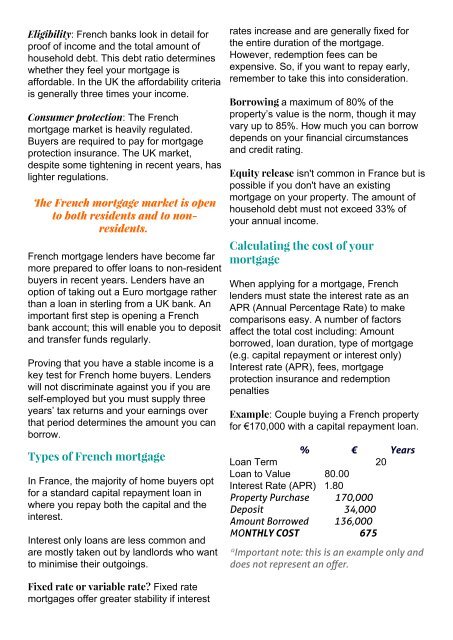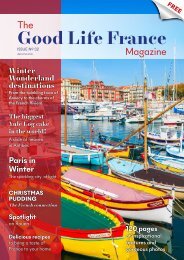Issue No. 25
In this issue, visit France from home - Gascony, and Provence, fabulous day trips from Paris, captivating Toulouse and charming Northern France. Recipes, guides and a whole heap more to entertain and inspire...
In this issue, visit France from home - Gascony, and Provence, fabulous day trips from Paris, captivating Toulouse and charming Northern France. Recipes, guides and a whole heap more to entertain and inspire...
- No tags were found...
Create successful ePaper yourself
Turn your PDF publications into a flip-book with our unique Google optimized e-Paper software.
Eligibility: French banks look in detail for<br />
proof of income and the total amount of<br />
household debt. This debt ratio determines<br />
whether they feel your mortgage is<br />
affordable. In the UK the affordability criteria<br />
is generally three times your income.<br />
Consumer protection: The French<br />
mortgage market is heavily regulated.<br />
Buyers are required to pay for mortgage<br />
protection insurance. The UK market,<br />
despite some tightening in recent years, has<br />
lighter regulations.<br />
The French mortgage market is open<br />
to both residents and to nonresidents.<br />
French mortgage lenders have become far<br />
more prepared to offer loans to non-resident<br />
buyers in recent years. Lenders have an<br />
option of taking out a Euro mortgage rather<br />
than a loan in sterling from a UK bank. An<br />
important first step is opening a French<br />
bank account; this will enable you to deposit<br />
and transfer funds regularly.<br />
Proving that you have a stable income is a<br />
key test for French home buyers. Lenders<br />
will not discriminate against you if you are<br />
self-employed but you must supply three<br />
years’ tax returns and your earnings over<br />
that period determines the amount you can<br />
borrow.<br />
Types of French mortgage<br />
In France, the majority of home buyers opt<br />
for a standard capital repayment loan in<br />
where you repay both the capital and the<br />
interest.<br />
Interest only loans are less common and<br />
are mostly taken out by landlords who want<br />
to minimise their outgoings.<br />
rates increase and are generally fixed for<br />
the entire duration of the mortgage.<br />
However, redemption fees can be<br />
expensive. So, if you want to repay early,<br />
remember to take this into consideration.<br />
Borrowing a maximum of 80% of the<br />
property’s value is the norm, though it may<br />
vary up to 85%. How much you can borrow<br />
depends on your financial circumstances<br />
and credit rating.<br />
Equity release isn't common in France but is<br />
possible if you don't have an existing<br />
mortgage on your property. The amount of<br />
household debt must not exceed 33% of<br />
your annual income.<br />
Calculating the cost of your<br />
mortgage<br />
When applying for a mortgage, French<br />
lenders must state the interest rate as an<br />
APR (Annual Percentage Rate) to make<br />
comparisons easy. A number of factors<br />
affect the total cost including: Amount<br />
borrowed, loan duration, type of mortgage<br />
(e.g. capital repayment or interest only)<br />
Interest rate (APR), fees, mortgage<br />
protection insurance and redemption<br />
penalties<br />
Example: Couple buying a French property<br />
for €170,000 with a capital repayment loan.<br />
% € Years<br />
Loan Term 20<br />
Loan to Value 80.00<br />
Interest Rate (APR) 1.80<br />
Property Purchase 170,000<br />
Deposit 34,000<br />
Amount Borrowed 136,000<br />
MONTHLY COST 675<br />
*Important note: this is an example only and<br />
does not represent an offer.<br />
Fixed rate or variable rate? Fixed rate<br />
mortgages offer greater stability if interest


















